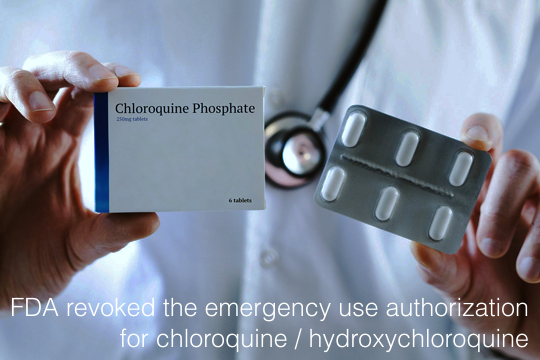// Documenti disponibili n: 46.581
// Documenti scaricati n: 36.630.443

The U.S. Food and Drug Administration today announced the following actions taken in its ongoing response effort to the COVID-19 pandemic:
Today, 15 june 2020, the U.S. Food and Drug Administration (FDA) revoked the emergency use authorization (EUA) that allowed for chloroquine phosphate and hydroxychloroquine sulfate donated to the Strategic National Stockpile to be used to treat certain hospitalized patients with COVID-19 when a clinical trial was unavailable, or participation in a clinical trial was not feasible.
The agency determined that the legal criteria for issuing an EUA are no longer met. Based on its ongoing analysis of the EUA and emerging scientific data, the FDA determined that chloroquine and hydroxychloroquine are unlikely to be effective in treating COVID-19 for the authorized uses in the EUA. Additionally, in light of ongoing serious cardiac adverse events and other potential serious side effects, the known and potential benefits of chloroquine and hydroxychloroquine no longer outweigh the known and potential risks for the authorized use. This is the statutory standard for issuance of an EUA.
The Biomedical Advanced Research and Development Authority (BARDA) within the U.S. Department of Health and Human Services originally requested the EUA covering chloroquine and hydroxychloroquine, and the FDA granted the EUA on March 28, 2020 based on the science and data available at the time. Today, in consultation with the FDA, BARDA sent a letter to the FDA requesting revocation of the EUA based on up to date science and data.
“We’ve made clear throughout the public health emergency that our actions will be guided by science and that our decisions may evolve as we learn more about the SARS-CoV-2 virus, review the latest data, and consider the balance of risks versus benefits of treatments for COVID-19,” said FDA Deputy Commissioner for Medical and Scientific Affairs Anand Shah, M.D. “The FDA always underpins its decision-making with the most trustworthy, high-quality, up-to-date evidence available. We will continue to examine all of the emergency use authorizations the FDA has issued and make changes, as appropriate, based on emerging evidence.”
The FDA has a responsibility to regularly review the appropriateness of an EUA, and as such, the agency will review emerging information associated with the emergency uses for the authorized products. Recent results from a large randomized clinical trial in hospitalized patients, a population similar to the population for which chloroquine and hydroxychloroquine were authorized for emergency use, demonstrated that hydroxychloroquine showed no benefit on mortality or in speeding recovery. This outcome was consistent with other new data, including data showing that the suggested dosing regimens for chloroquine and hydroxychloroquine are unlikely to kill or inhibit the virus that causes COVID-19. The totality of scientific evidence currently available indicate a lack of benefit.
“While additional clinical trials continue to evaluate the potential benefit of these drugs in treating or preventing COVID-19, we determined the emergency use authorization was no longer appropriate. This action was taken following a rigorous assessment by scientists in our Center for Drug Evaluation and Research,” said Patrizia Cavazzoni, M.D., acting director of the FDA’s Center for Drug Evaluation. “We remain committed to using every tool at our disposal in collaboration with innovators and researchers to provide sick patients timely access to appropriate new therapies. Our decisions will always be based on objective and rigorous evaluation of the scientific data.This will never change.”
Chloroquine and hydroxychloroquine are both FDA-approved to treat or prevent malaria. Hydroxychloroquine is also approved to treat autoimmune conditions such as chronic discoid lupus erythematosus, systemic lupus erythematosus in adults, and rheumatoid arthritis. Both drugs have been prescribed for years to help patients with these debilitating, or even deadly, diseases, and FDA has determined that these drugs are safe and effective when used for these diseases in accordance with their FDA-approved labeling. Of note, FDA approved products may be prescribed by physicians for off-label uses if they determine it is appropriate for treating their patients, including during COVID.
The FDA, an agency within the U.S. Department of Health and Human Services, protects the public health by assuring the safety, effectiveness, and security of human and veterinary drugs, vaccines and other biological products for human use, and medical devices. The agency also is responsible for the safety and security of our nation’s food supply, cosmetics, dietary supplements, products that give off electronic radiation, and for regulating tobacco products.
FDA revoked the emergency use authorization (EUA) that allowed for chloroquine phosphate and hydroxychloroquine sulfate donated to the Strategic National Stockpile to be used to treat certain hospitalized patients with COVID-19 when a clinical trial was unavailable, or participation in a clinical trial was not feasible. Based on its ongoing analysis of the EUA and emerging scientific data, the FDA determined that chloroquine and hydroxychloroquine are unlikely to be effective in treating COVID-19 for the authorized uses in the EUA. Additionally, in light of ongoing serious cardiac adverse events and other potential serious side effects, the known and potential benefits of chloroquine and hydroxychloroquine no longer outweigh the known and potential risks for the authorized use.
The agency issued a Press Release and posted FAQs about this action.
Collegati
Testata editoriale iscritta al n. 22/2024 del registro periodici della cancelleria del Tribunale di Perugia in data 19.11.2024